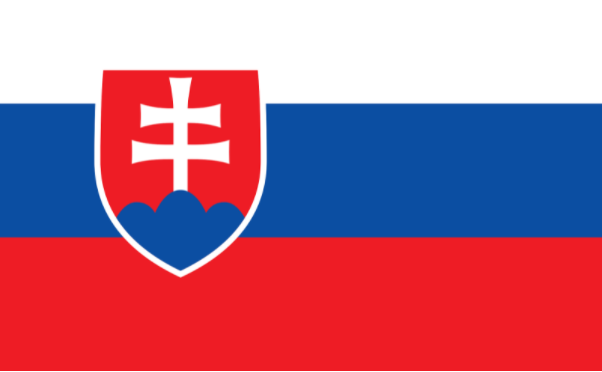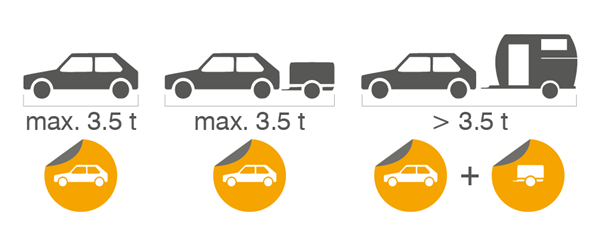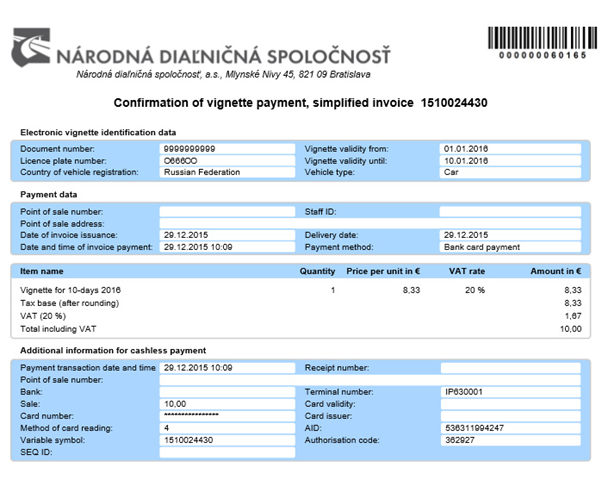Slovakia
Back to other articles
SLOVAKIA - SK
| Official language | Slovak |
| Capital | Bratislava |
| Largest cities | Bratislava, Kosice, Nitra, Presov, Zilina |
| Currency | euro EUR |
| ISO Code | SK |
| Telephone code | 421 |
| Timezone | CET (UTC 1, summer UTC 2) |
| Automotive traffic | right-hand |

Payment for roads
Payment for roads for vehicles with a total weight of up to 3.5 t

There is a fee (electronic vignette) for the use of limited sections of highways and express roads in Slovakia by motor vehicles of foreign countries.
The amount of the fee is related to the duration of the use of the motorways, regardless of the distance traveled or the number of passes.
Motorways that are not allowed to travel without a vignette are marked with the appropriate "s hradou" sign.

The electronic vignette can be purchased through theInternet portal or using theeznamka mobile app .
In addition, an electronic vignette can be purchased at points of sale marked with the e-vignette logo (eznmka),
at border checkpoints, which are open 24 hours a day, or at individual gas stations.
When buying a vignette, you must specify the type of car:
- a car without a trailer with a total weight of up to 3.5t
- a car with a trailer with a total weight of up to 3.5t
- a car with a trailer with a total weight of more than 3.5 tons - in this case, you need to buy a vignette for both the car and the trailer

Vignette cost
| Validity | The cost |
| 10 days | 10 |
| 30 days | fourteen |
| 365 days | fifty |
To buy a vignette through the portal, press the button payment for the motorway vignette

In the next window, select the type of vehicle - a car or a trailer

Then we fill in the information about the vehicle: registration number, country of registration, start date of the vignette (the end date is set automatically depending on the validity of the vignette), email address and phone number (optional).
.jpg)
Then we proceed to paying for the vignette.

Payment for roads for vehicles with a total weight of over 3.5 t
In Slovakia, vehicles that are obliged to pay tolls must be registered in an electronic toll collection system before entering restricted road sections, and must also have a properly installed on-board device, which is required for the entire network of restricted road sections.
An on-board device is a technical electronic device that allows, by means of an electronic toll collection system, to uniquely identify both the vehicle itself and its position. The on-board device cannot be transmitted, because it is a stationary device.
In Slovakia, on-board instruments are used, which combine three main technologies:
● GPS satellite positioning technology (provides collection of data on the use of limited road sections);
● GSM / GPRS technology for communication in mobile networks (provides data transfer between the on-board device and other information systems within the electronic toll collection system);
● DSRC microwave technology for short-range communications (used to monitor toll payers as part of the toll payment process).
The on-board unit contains current geographic data on limited road sections subject to toll payment (so-called GEO model). Once installed in the vehicle and correctly configured, the OBU immediately starts working. While driving, the on-board device monitors the location of the vehicle on limited road sections using the global satellite monitoring system (GPS), and compares it with the stored data in the GEO model. If the algorithm of the on-board device, based on the comparison of these data, determines that the vehicle has used a limited area subject to toll payment, in accordance with the current legislation, it will generate a corresponding record of this fact.
OBU 1374 On-Board Unit

The OBU 1374 on-board instrument without a holder has the following dimensions: 14512641.2 mm and a weight of about 480 g. On the front panel of the instrument there are display, control and signaling elements that allow the driver to correctly configure and use the on-board instrument. The GPS receiver module has a built-in passive antenna with the ability to actively connect an external antenna. An integral part of the on-board instrument is the basic equipment for connecting it to a lighter in a car.
SitrafficSensusUnit on-board device

The SitrafficSensusUnit on-board device without a holder has the following dimensions: 1459336 mm and a weight of about 260 g. The front panel of the device contains a display and a four-way navigation button with a status indicator, which allow the driver to correctly configure and use the on-board device. An integral part of the on-board instrument is the basic equipment designed to connect it to the cigarette lighter in the car.
On-board instrument Billien OBU 5010

The Billien OBU on-board instrument without a holder has the following dimensions: 1459240 mm and a weight of about 290 g. The front panel of the instrument contains a display, four control buttons and light and sound signaling elements that allow the driver to correctly configure and use the on-board instrument. An integral part of the on-board instrument is the basic equipment designed to connect it to the cigarette lighter in the car.
On-board instrument Billien OBU 5051

The Billien OBU 5051 on-board instrument without a holder has the following dimensions 145 x 92 x 40 mm and a weight of 290 g. On the front panel of the instrument there are four control buttons and light and sound signaling elements that allow the driver to correctly configure and use the on-board instrument. An integral part of the on-board instrument is the basic equipment designed to connect it to the cigarette lighter in the car.
Detailed instructions for using the devices can be foundhere.
To receive the device, it is necessary to register the vehicle on the website or at the contact point.
After concluding a contract for the provision of an on-board device, the system manager issues the on-board device with accessories to the vehicle operator personally at the service point, or by courier.
In the prepaid mode, the OBU can be received and returned by the driver of the vehicle.
A map of toll road sections in Slovakia can be foundhere .
Road network
Autobahns (dial'nica) are numbered with the letter D and a single digit. Indicated by a sign with a green field and white text.
Expressways (rchlostn cesta) are numbered with the letter R and a single digit. Indicated by a sign with a blue field and white text.
Class I roads (cesta I. triedy) are numbered with one or two digits. Indicated by a sign with a blue field and white text.
Class II roads (cesta II. Triedy) are numbered with a three-digit number. Indicated by a sign with a blue field and white text.
Class III roads (cesta III. Triedy) are numbered with four digits. Indicated by a sign with a blue field and white text.
Bans on weekends, holidays, seasonal (traffic ban)
On Sundays and holidays from 00:00 to 22:00 hours;
on Saturdays from 1 July to 31 August from 07:00 to 19:00 hours.
On highways, international roads and arterial roads
Features of driving at night
There is no general ban on driving at night in Slovakia
Winter driving features
Tires
The use of winter tires (MS) is compulsory for trucks with an MPW of over 3.5 tonnes from 15 November to 31 March.
Chains
The use of chains is mandatory. They must be installed at the behest of road signs or when the road is covered with snow or ice.
The use of studded tires is prohibited.
Store Chains
Tesco: https://tesco.sk
Metro: https://www.metro.sk
Billa: https://www.billa.sk
Coop: https://www.coop.sk
Delia: https://deliapotraviny.sk
Fresh: https://www.freshobchod.sk
Kraj: https://krajpotravin.sk
Lidl: https://www.lidl.sk
Terno: https://www.terno.sk
Mobile communication
Orange: https://www.orange.sk
Telekom: https://www.telekom.sk
O 2: https://www.o2.sk
4KA: https://www.4ka.sk
